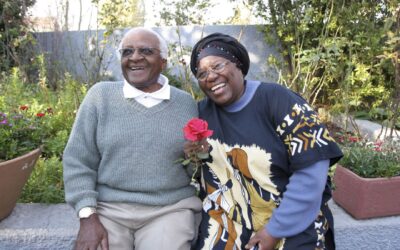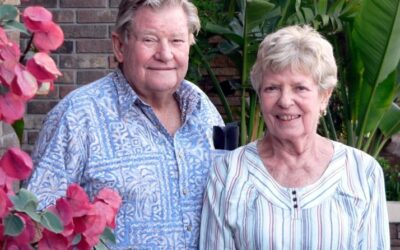Lexie and Ian knew each other from childhood on the outskirts of Glasgow. Ian was an only child, eager for Lexie’s sisterly advice and culinary tips for his wild bounty of berries: raspberries, brambles, blaeberries and sloes collected from the countryside. Ian gathered not just the rose haws for vitamin C (offerings he made to his school teachers during the food scarcity of post-wartime Scotland) but the flower of the rose Lexie so loved.

Lexie & Ian before they were married in 1960.
She took delight in all flowers and so Ian offered her a rainbow of Scottish wildflowers–from the pink dog-rose, the orange field poppy, yellow bird’s foot to the spiky purple vetch and inevitable thistle. He plucked the yarrow for her to hide under her pillow to help her find her lover, but the red clover he kept on him so that its scent might lead her back to him in the impenetrable Scottish fog. It did. She found him.
After they married they moved to northern Scotland for Ian’s first teaching job. Lexie used to walk the snowy village in northern Inverness-shire, pushing wee David in his pram to keep them both warm while gathering firewood. It was too cold to sit in their unheated cottage, “baltic” as Lexie used to often say. They wisely planted a vegetable garden which fed them particularly when they were ‘skint’. Ian always knew where to find the wild fruit to make jam and Lexie always joined the WRI (Woman’s Rural Institute) winning many prizes with her concoctions. Lexie was a joiner, a believer in contribution.
Lexie never questioned second place because it wasn’t the placement that mattered, it was the doing, the getting on with things. She had done well at school but because she was a girl, she was not allowed to go to university. Her father’s narrowmindedness did not stop her. She became a pharmacologist, her knowledge and work ethic becoming the support for her husband Ian so that he might obtain his Master’s degree in English Literature. She believed in him and his work on Henry James. But she also liked to read.
Eventually, while looking after three children, her husband and father-in-law, Lexie got her university degree in English Literature. She liked Conrad, his power of the written word to make one see. The power of Lexie’s eye to make one see was striking: not in the sense of sheer volume, range of sight but her magnificent focusing. That same reason perhaps that Conrad loved the solid stance of his world at sea, where he could stand amidst and look out to the wild, terrifying, glorious sea and sky, Lexie stood firm in the ship of her self, her engineering self, able and capable of balance amid life’s tumults to measure and make do so well, even with her Lupus joints working against her. She could fix floors, food, furniture, flower gardens and foreign students with their English, to name a few. Lexie, ever-ready with her well-oiled tools and a G & T thrown in for good measure.
With Lexie, there was no swithering. She was an engineer, the word “engine” deriving from the Latin ingenium (c. 1250), meaning “innate quality, especially mental power, hence a clever invention.”[5] That’s what Lexie was like. She could make things work, even us. We all benefitted, not just Ian and her three children and granddaughter spread around the world, but all who knew her.
Once retired to Lyon Cottage in Strathtay, Lexie gave her time to the Scottish Presbyterian Church not to mention gardening, golf and writing clubs. Lexie kept the key to the old church and churchyard at Logierat and was able to fill me in on some of the Macdonald family history in the Tay Valley. She made friends up and down the valley, helping the housebound with transportation and groceries. All this while never complaining of her own struggle with Lupus. What irony that it was an accident, not Lupus that sent her spiraling. When Lexie was dropped off after a meeting, her scarf caught in the car door. Her friend drove off, not realizing that Lexie was being dragged along the icy road. Although those injuries did not stop her, the pain from those injuries which Lexie tolerated so silently and stoically, veiled undetected cancer cells that took her life last December without warning.
In her wake, sea-gleams of heaven.











0 Comments